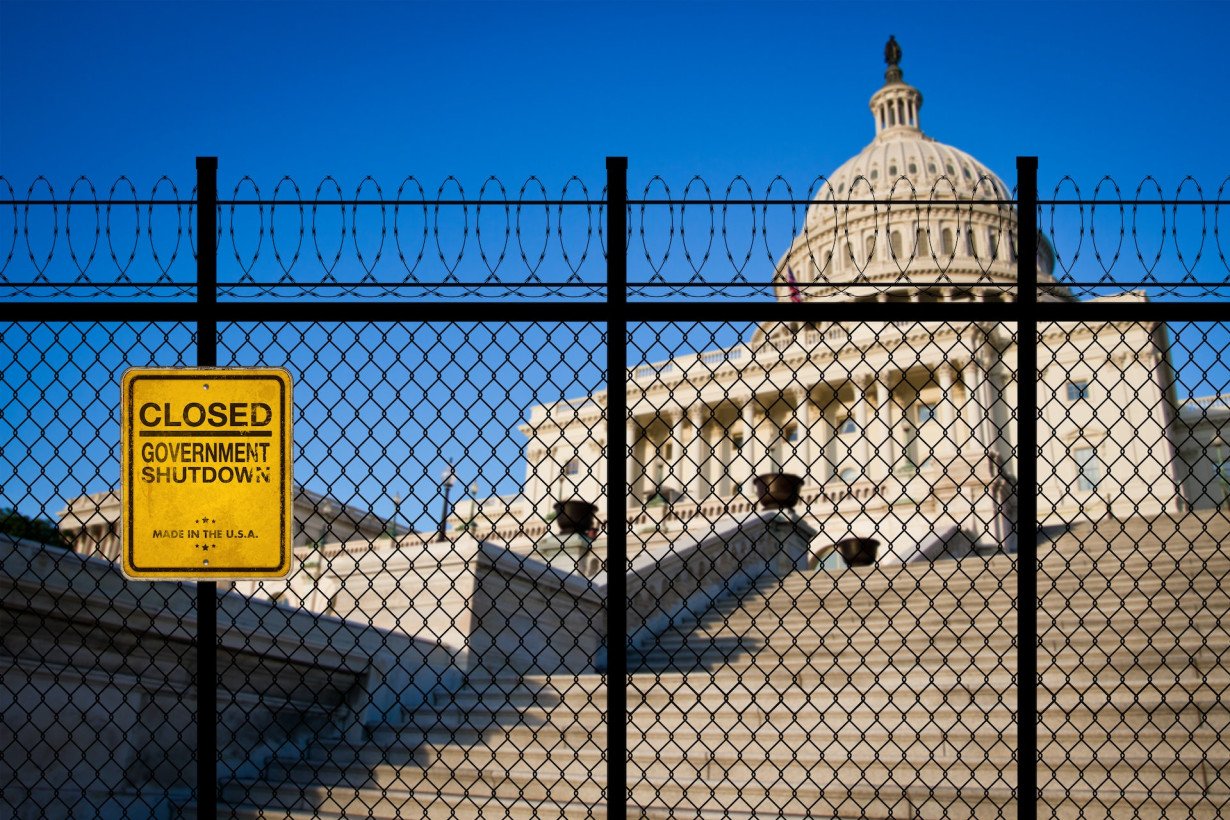Congress has just days to keep the federal government from grinding to a halt, and a last-minute deal seems increasingly unlikely. The problem is that lawmakers need to pass a dozen appropriations bills – or a single continuing resolution – by Sept. 30, 2023, in order to keep the government’s lights on. But a key group of House Republicans is refusing to pass anything without steep spending cuts. No bills, no government – at least for a few days or weeks, anyway.
While fiscal discipline has long been the rallying cry for shutdown supporters, the tactic isn’t necessarily effective at reducing the government’s deficit.
I’ve been following efforts to shut down the U.S. government for one reason or another for more than 40 years, first from various perches at the Congressional Budget Office, then at the National Governors Association, and now as a professor of public policy. History shows that shutdowns are counterproductive – at least as measured by their own defenders’ goals. Fortunately, the past also provides a proven way to reduce the deficit, which I agree is a laudable goal.
Deficits are too high
When House Republicans say America’s finances are in bad shape, they do have a point. The deficit, currently estimated at US$1.5 trillion, and debt held by the public, estimated at $25.8 trillion, are both dangerously high.
Why is the status quo so risky? For one thing, large deficits are inflationary and put pressure on the Federal Reserve to raise interest rates. For another, interest on public debt is now estimated to be $663 billion a year, which is slightly over 10% of total spending – a huge fiscal burden.
Finally, and most importantly, at some point individuals and foreign countries may dump U.S. treasury bills and bonds on the market because of a loss in confidence. That would make interest rates spike and could create a major economic collapse.
Because of these risks, members of the House Freedom Caucus have threatened to shut down the federal government on Oct. 1, the beginning of the next fiscal year, if they aren’t able to get big cuts to domestic discretionary spending.
Negotiations are further complicated by some House Republicans’ desires to add riders about the border and culture war issues to the must-pass spending bills, as well as the Biden administration’s request for $24 billion for Ukraine, which not all party members support.
Fighting the wrong battle
I would argue that now is the wrong time for Republicans to take a stand on reducing the deficit, for two reasons.
First of all, shutdowns don’t get results. The U.S. has had 21 shutdowns over the past five decades, three of which have been major. These have all caused real harm to the U.S. economy, but they haven’t led to the spending levels Republicans wanted.
What’s more, in each case, the public blamed Republicans for the shutdowns, polls show. Some historians have even suggested that the fallout from the weekslong 1995-96 shutdown contributed to then-speaker Newt Gingrich having to resign in 1998.
Second, the cuts Republicans are seeking aren’t all that significant. The bottom line is that they’re ignoring national defense and mandatory spending, which together represent 75% of total spending. The current effort aims only to trim domestic discretionary spending, which makes up a small and shrinking slice of the federal-spending pie – less than 15% in 2023.
At the same time, mandatory spending, including entitlements, totals nearly $4 trillion annually and is growing rapidly. So, even if Democrats agreed to the domestic discretionary-spending cuts advocated by the House Freedom Caucus, those savings would be overtaken by growth in entitlement spending – primarily Social Security, Medicare and Medicaid – within a year.
What’s more, any serious plan to reduce the federal deficit must consider increasing the $4.8 trillion of federal revenue. The House Freedom Caucus has expressed no interest in raising taxes.
The bottom line, in my view, is that the shutdown strategy is more about creating drama, publicity and campaign fundraising for certain lawmakers than it is about seriously reducing the deficit.
How to get results
While it’s never politically easy to cut entitlements or raise taxes, the reconciliation provision in the 1974 Congressional Budget and Impoundment Control Act was enacted specifically for this purpose. It allows entitlement cuts and tax increases to be incorporated into the same bill, which cannot be filibustered in the Senate and only needs a majority for passage.
Over the past 40 years, there have been six serious budget negotiations that resulted in deficit reductions. One in 2011, negotiated by then-President Barack Obama and House Majority Leader John Boehner, was likely the most successful from a fiscal perspective. When it was finally enacted, it generated $1.95 trillion in deficit reduction over nine years.

A similarly successful negotiation came in 1997 during the Clinton administration. Lawmakers cut national defense spending by $247 billion, nondefense discretionary spending by $273 billion and entitlements by $374 billion, with interest savings of $142 billion. They also reduced taxes by $220 billion, mostly for low-income individuals, which brought the net total to $816 billion in deficit reduction over 10 years.
In addition to those successes, there were four other negotiations in 1993, 1990, 1985 and 1983 that averaged over $400 billion in deficit reduction, albeit over different timelines.
These examples show that budget negotiations without threatening a shutdown can be effective at enacting major deficit-reduction plans into law. The one during the Clinton administration even led to the budget surpluses in the years from 1998 to 2001, the first surpluses since 1969.
History indicates that there are three major requirements for a successful budget negotiation. First, lawmakers must be seriously committed to the goal of deficit reduction. Second, everything needs to be on the table, including revenues, entitlements and national defense. Third, there must be trust among the negotiators.
Unfortunately, I don’t believe any of these requirements can be met today.

Raymond Scheppach does not work for, consult, own shares in or receive funding from any company or organisation that would benefit from this article, and has disclosed no relevant affiliations beyond their academic appointment.

 Joe Biden’s record on science and tech: Investments and regulation for vaccines, broadband, microchips and AI
Joe Biden’s record on science and tech: Investments and regulation for vaccines, broadband, microchips and AI
 Meta shift from fact-checking to crowdsourcing spotlights competing approaches in fight against misinformation and hate speech
Meta shift from fact-checking to crowdsourcing spotlights competing approaches in fight against misinformation and hate speech
 Fire tornadoes are a risk under California's extreme wildfire conditions
Fire tornadoes are a risk under California's extreme wildfire conditions
 In eyeing Greenland, Trump is echoing long-held American designs on the Arctic expanse
In eyeing Greenland, Trump is echoing long-held American designs on the Arctic expanse
 78 dead at abandoned South Africa gold mine that was scene of a standoff. Toll is expected to rise
78 dead at abandoned South Africa gold mine that was scene of a standoff. Toll is expected to rise
 Poland's leader accuses Russia of planning acts of sabotage against 'airlines around the world'
Poland's leader accuses Russia of planning acts of sabotage against 'airlines around the world'
 Jayden Daniels accomplishes a feat last done by Slinging Sammy Baugh in 1937
Jayden Daniels accomplishes a feat last done by Slinging Sammy Baugh in 1937
 Wildfires latest: A final round of dangerous fire weather and dry conditions is in the forecast
Wildfires latest: A final round of dangerous fire weather and dry conditions is in the forecast
 Kamala Harris memes questioning her cultural background highlight Americans’ contradictions with race
Kamala Harris memes questioning her cultural background highlight Americans’ contradictions with race
 Past as prologue: October could bring yet another government shutdown.
Past as prologue: October could bring yet another government shutdown.







